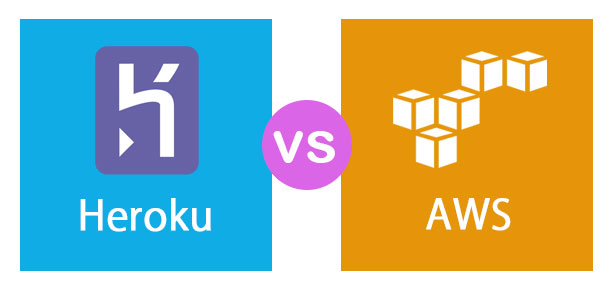Updated May 22, 2023

Difference Between Heroku and AWS
Heroku and AWS are defined as the cloud hosting platform, in Heroku are owned by the salesforce, and its customer can build, scale, and deploy their applications. In contrast, Amazon owns AWS and is an IaaS platform that offers a large set of services for its customers; along with this difference, they differ in the database, In-memory cache storage, Tools, Cloud computing, Cost of Database, in-memory data storage cost, main storage cost, etc. overall Heroku opts for startups. AWS is suitable for users who have experience with AWS products.
What is Cloud Hosting?
- The process through which cloud services are procured for the deployment of services, data, and solutions. This hosting is an Iaas(infrastructure as service) cloud delivery model providing virtual services. Here, the buyers’ primary needs are virtual hardware, storage, network, and solutions from a cloud vendor. So this technique’s major advantage is that the greater computing power gets shared across multiple users for simultaneous usage.
- Cloud hosting provides unexploited elasticity in scaling hosted resources. Moreover, cloud hosting may also merge the ability of several servers to offer a single cloud-hosted server. Cloud storage, desktops, and servers are the major hosted services. Ensuring permanent access to data, editing, and file modification can also be achieved from any location worldwide. A secure backup of the data is also made available.
Why Cloud services?
- Flexibility: It offers excellent flexibility and capacity to manage cloud services such as data in a large set of manners.
- Backup: Secure backup of the data is made available.
- Collective Usage of Data: ensuring permanent access to data, so editing and file modification can also be achieved worldwide.
- Cloud Hosting: It provides unexploited elasticity in scaling hosted resources. Moreover, cloud hosting may also merge the ability of several servers to offer a single cloud-hosted server. Cloud storage, desktops, and servers are the major hosted services.
What is Heroku?
- The cloud-based platform where customers can build, scale, and deploy their applications. Heroku has add-ons (over 140) intended to cover different purposes, from notifications to security services.
- This platform increases team productivity through environments from which the applications are rolled out for development. More than elastic compute Cloud, the Heroku systems are straightforward to use.
What is AWS?
AWS is also an Iaas platform that offers its customers many services. It provides services on analytics, management, and data. Amazon Simple Storage Service (S3) and Elastic Compute Cloud (EC2) are broadly popular services of these platforms.
Head-to-Head Comparison Between Heroku vs AWS (Infographics)
Below are the top 11 differences between Heroku vs AWS:
Key Differences Between Heroku and AWS
Let us discuss some of the major differences between Heroku vs AWS:
1. The server creation process can be achieved in less than 10 seconds in Heroku systems, which seems to be an excessively pace service than AWS.
2. Git push is used in Heroku for deployment reasons
3. AWS services are largely scalable
4. A large set of services are joined and sold with AWS services
5. AWS stands out as one of the least expensive cloud hosting systems, despite the somewhat variable design of its price policy.
6. A cloud-based platform where customers can build, scale, and deploy their applications. Heroku has add-ons (over 140) intended to cover different purposes, from notifications to security services.
7. AWS is also an Iaas platform that offers its customers a large set of services. It provides services on analytics, management, and data. Amazon Simple Storage Service (S3), as well as Elastic Compute Cloud (EC2), are largely popular services of this platform
8. The log analysis process is much easier with Heroku systems, achieved by adding facilities like solr.
9. On excluding the bandwidth limitations, it is free for one stream installation
10. AWS offers a large extent of flexibility when it comes to infrastructure perspective
11. there is considerable time to develop the mobile or web application setup.
12. AWS offers services on analytics, management, and data. Amazon Simple Storage Service (S3), as well as Elastic Compute Cloud (EC2), are primarily popular services of these platforms
13. Heroku platform increases team productivity through environments from which the applications are rolled out for development. More than elastic compute Cloud, the Heroku systems are easy to use.
Heroku vs AWS Comparison of Table
Let us discuss the topmost differences between Heroku vs AWS:
| Basis of Comparison | Heroku | AWS |
| Owner | Salesforce | Amazon |
| Servers | AWS servers | Proprietary |
| Database | Heroku Postgres | RDS Postgres |
| In-memory cache storage | Heroku Redis, with a storage area of 10 GB | ElastiCache with a storage area of 12 GB |
| Major features |
|
|
| Tools | Command Line
Request Metrics Connect Status |
Visual Studio
Eclipse |
| (Cost)Cloud computing
Database In-memory datastore |
$4,000.00
$750.00 $1,450.00 |
$2,000.00
$600.00 $164.16 |
| Main storage | $800
|
$800
|
| Total | $7,000.00 | $3,564.16 |
Conclusion
Heroku is preferred for startups, whereas AWS is suitable for users with prior experience with AWS products.
Recommended Articles
This has been a guide to Heroku vs AWS. Here we discuss Heroku vs AWS key differences with infographics and a comparison table. You can also go through our other suggested articles to learn more –

